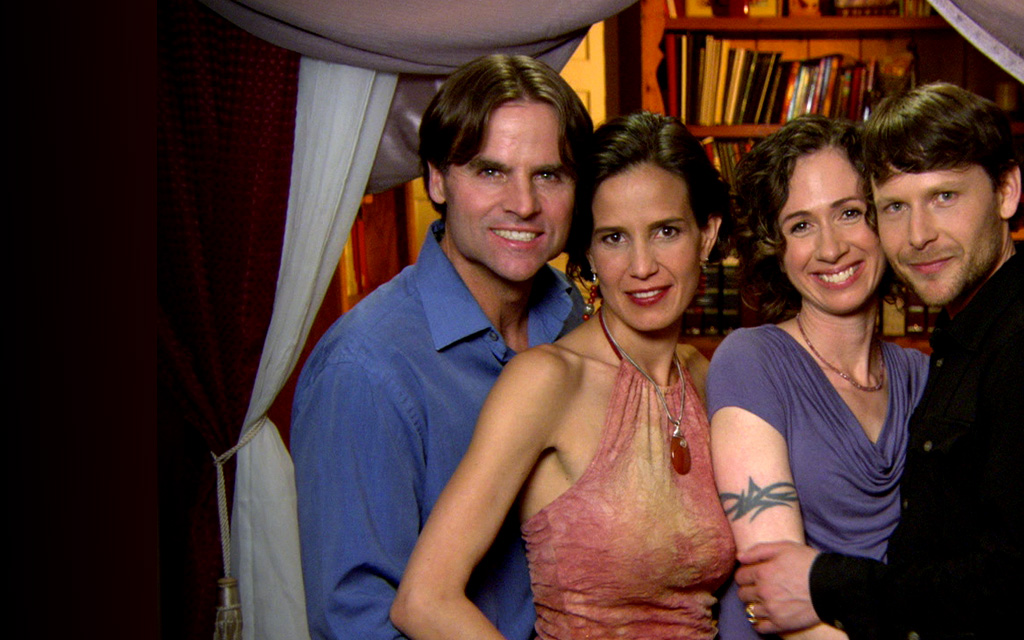So we just jumped straight into polyswinging and then polyamory. It's going to keep popping up, of course. Why? We're all about exploring ways to make your relationship better. Polyamory might be it? You never know. O.M. Grey, a knowledgeable polyamory writer and prolific blogger, talks about the characteristics of a polyamorists. Is your relationship ready for polyamory? O.M. Grey explains more. Read on!
* * *
I’ve learned so much in the past two years. And I’m going to share it with you without holding back. Not even a little bit. This is “my truth,” as the new-agey, responsibility-avoiding people like to say.
My husband and I have been polyamorous for about seven years. Although, I suppose the first few were much more about being a non-descript form of an open marriage since we weren’t seeking multiple, committed, loving relationships. The theory behind our lifestyle is what I’ve said again and again: Love breeds love and desire breeds desire. Any encounter we had outside our marriage during those first few years were very open and the intentions on both sides were very, very clear.
When we moved into practicing polyamory (seeking out another committed, loving relationship) I learned not everyone has the same definition of polyamory as us. Well, as those people who are successfully practicing a polyamory lifestyle do.
So let's take apart, "poly" and "amory" to understand better.
What is poly?
Most people who love to call themselves (and hide behind) “poly” are really focused on quantity rather than quality. Alright. I can have more than one girlfriend/lover. So, I’m going to have three! Because, let’s see... I’ve never been able to make a relationship with one woman work long term, so I’m going to try with three! That’s the ticket! That’s the answer! That’s where I’ve been going wrong for the past 15 years!
Most people I’ve met in the Austin poly community are not practicing polyamory. They’re dating. They go from several short-term relationships to several short-term relationships, none lasting more than 3-6 months. Hello! Not polyamory! That’s dating! And not dating very successfully because they keep ending!
Also in the Austin, poly community are several truly polyamorous families. They are what’s known as the “core group.” One of them even call themselves the polypod, and I think that’s rather adorable. The polypod, from what I’ve seen (and I’ve only seen them from a distance), as well as the few other multi-relationship groups who I know a little better and I’d consider friends, are doing it well. And by well, I mean successfully. They are open, honest, respectful, loving and supportive. They commit and invest in their relationships.
They might have casual sex on the side from time to time, but it’s after their current relationships are firmly established and secure. Because, after all, it’s about more love… not more sex. And the few times you need to fulfill that biological need with someone different, then be honest about that. Never lie to get laid. How disgusting.

What about 'amory' or love?
The most successful polyamorous relationships I’ve seen focus much more on the “amorous” part of the word, less on the “poly” part. It’s about love! It’s all about love! Relationships take effort, investment, time and energy to solidify. If you claim to be poly, think about this: If you want to be poly, think about this:
Take. One. Relationship. At. A. Time.
When your first relationship has a solid foundation (and I mean SOLID foundation), the kind that takes at least a year, if not more, to establish, then look for a second one. This is not a race to see who can have the biggest harem. And, by the way, if you’re building a harem. YOU’RE NOT POLY! You’re a misogynist and a predator who sees women as life support systems for their pussies.
How to become polyamorous
Romantic relationships contain drama (how I’ve come to loathe that word). It’s built in. Everyone has their insecurities and their baggage. Everyone has their idiosyncrasies. It takes time to build a solid foundation and learn how to communicate with each other. Build trust. Establish and maintain intimacy. Minimize and handle inevitable conflicts. Ease through misunderstandings. Manage fears and insecurities on both side. Get to a level of comfort and security in yourselves and each other.
Then, open up to dating others. I’m not talking about casual sex unless that’s specifically what you’re looking for. If it is, be very up front about that. Because polyamory means multiple, loving, committed relationships, or the pursuit thereof. Set clearly defined rules and don’t break them, or that will damage the trust you just spent a year building. Once you meet someone you think you can form a deeper relationship with, close off dating others. Focus on solidifying that second relationship while maintaining the first for another year!
Insecurities will pop up. Jealousies (and yes, they don’t magically disappear when you label yourself polyamorous) and misunderstandings will arise.
Give yourself time to learn about, develop, and nurture this other love. Commit yourself to making it work, for, again (and I repeat myself so much because so many people just don’t get it).
Healthy relationships require effort, investment and responsibility!
After the second relationship is solidified and the first is stronger than before, and you still have extra time/needs that aren’t being met, then look for a third relationship. But always remember, finding another significant other isn’t about finding someone better, it’s about increasing the love and the desire among your own little polypod. It’s about ensuring that everyone you love feels loved, not ignored or pushed to the side or replaced.
It’s about more love. Always, more love.
If you don’t have time/energy/capacity to manage, maintain, nurture, and grow one or two relationships, plus your job, plus your kids, plus time for yourself and your friends – why do you want another? It’s a recipe for disaster and heartache on many levels. You don’t date someone for three months and say, “Okay, ‘primary’ – check. We’re ‘solid,’ so who’s next?”
 Fuck that. You’re not solid after three months. You’re barely starting. And if you run at the first sign of struggle, then, guess what, you're not a poly! If you find yourself saying “I want to be able to do what I want when I want, without responsibility or accountability,” then you’re not poly. You’re selfish.
Fuck that. You’re not solid after three months. You’re barely starting. And if you run at the first sign of struggle, then, guess what, you're not a poly! If you find yourself saying “I want to be able to do what I want when I want, without responsibility or accountability,” then you’re not poly. You’re selfish.
The last two years have been difficult, as you all have seen from reading this blog, especially the past few months. Do you really think my marriage could’ve survived (let alone thrived and gotten stronger) if it hadn’t been quite literally unshakable?
And for those of you looking for you 100%-genuinely-happy-all-the-time-easy-no-drama-or-responsibility-perfect love? Grow the fuck up. There is no such thing. When you are a perfect partner, you’ll find your fairy tale perfect love. And let me tell you, mister, you’ve got a long fucking way to go. I guess the anger portion of the grieving has set in. It’s about fucking time.
This was a post by O.M. Grey. The original post can be found on her blog here.
 Nestled in the mountains of Northern California, Olivia M. Grey lives in the cobwebbed corners of her mind writing paranormal romance with a Steampunk twist. She dreams of the dark streets of London and the decadent deeds that occur after sunset. As an author of Steamy Steampunk, as well as a poet, blogger, podcaster, and speaker, Olivia focuses both her poetry and prose on alternative relationship lifestyles and deliciously dark matters of the heart and soul.
Nestled in the mountains of Northern California, Olivia M. Grey lives in the cobwebbed corners of her mind writing paranormal romance with a Steampunk twist. She dreams of the dark streets of London and the decadent deeds that occur after sunset. As an author of Steamy Steampunk, as well as a poet, blogger, podcaster, and speaker, Olivia focuses both her poetry and prose on alternative relationship lifestyles and deliciously dark matters of the heart and soul.
Her work has been published in various anthologies and magazines like Stories in the Ether, Steampunk Adventures, SNM Horror Magazine and How The West Was Wicked. Her premier Steampunk BDSM erotica novel, Avalon Revisited, is an Amazon.com Gothic Romance bestseller. She loves to host tea parties, and she runs a delightful game of charades, Victorian style. Follow her on Twitter @omgrey and subscribe to her on Facebook.
* * *
I’ve learned so much in the past two years. And I’m going to share it with you without holding back. Not even a little bit. This is “my truth,” as the new-agey, responsibility-avoiding people like to say.
My husband and I have been polyamorous for about seven years. Although, I suppose the first few were much more about being a non-descript form of an open marriage since we weren’t seeking multiple, committed, loving relationships. The theory behind our lifestyle is what I’ve said again and again: Love breeds love and desire breeds desire. Any encounter we had outside our marriage during those first few years were very open and the intentions on both sides were very, very clear.
When we moved into practicing polyamory (seeking out another committed, loving relationship) I learned not everyone has the same definition of polyamory as us. Well, as those people who are successfully practicing a polyamory lifestyle do.
So let's take apart, "poly" and "amory" to understand better.
What is poly?
Most people who love to call themselves (and hide behind) “poly” are really focused on quantity rather than quality. Alright. I can have more than one girlfriend/lover. So, I’m going to have three! Because, let’s see... I’ve never been able to make a relationship with one woman work long term, so I’m going to try with three! That’s the ticket! That’s the answer! That’s where I’ve been going wrong for the past 15 years!
Most people I’ve met in the Austin poly community are not practicing polyamory. They’re dating. They go from several short-term relationships to several short-term relationships, none lasting more than 3-6 months. Hello! Not polyamory! That’s dating! And not dating very successfully because they keep ending!
Also in the Austin, poly community are several truly polyamorous families. They are what’s known as the “core group.” One of them even call themselves the polypod, and I think that’s rather adorable. The polypod, from what I’ve seen (and I’ve only seen them from a distance), as well as the few other multi-relationship groups who I know a little better and I’d consider friends, are doing it well. And by well, I mean successfully. They are open, honest, respectful, loving and supportive. They commit and invest in their relationships.
They might have casual sex on the side from time to time, but it’s after their current relationships are firmly established and secure. Because, after all, it’s about more love… not more sex. And the few times you need to fulfill that biological need with someone different, then be honest about that. Never lie to get laid. How disgusting.

What about 'amory' or love?
The most successful polyamorous relationships I’ve seen focus much more on the “amorous” part of the word, less on the “poly” part. It’s about love! It’s all about love! Relationships take effort, investment, time and energy to solidify. If you claim to be poly, think about this: If you want to be poly, think about this:
Take. One. Relationship. At. A. Time.
When your first relationship has a solid foundation (and I mean SOLID foundation), the kind that takes at least a year, if not more, to establish, then look for a second one. This is not a race to see who can have the biggest harem. And, by the way, if you’re building a harem. YOU’RE NOT POLY! You’re a misogynist and a predator who sees women as life support systems for their pussies.
How to become polyamorous
Romantic relationships contain drama (how I’ve come to loathe that word). It’s built in. Everyone has their insecurities and their baggage. Everyone has their idiosyncrasies. It takes time to build a solid foundation and learn how to communicate with each other. Build trust. Establish and maintain intimacy. Minimize and handle inevitable conflicts. Ease through misunderstandings. Manage fears and insecurities on both side. Get to a level of comfort and security in yourselves and each other.
Then, open up to dating others. I’m not talking about casual sex unless that’s specifically what you’re looking for. If it is, be very up front about that. Because polyamory means multiple, loving, committed relationships, or the pursuit thereof. Set clearly defined rules and don’t break them, or that will damage the trust you just spent a year building. Once you meet someone you think you can form a deeper relationship with, close off dating others. Focus on solidifying that second relationship while maintaining the first for another year!
Insecurities will pop up. Jealousies (and yes, they don’t magically disappear when you label yourself polyamorous) and misunderstandings will arise.
Give yourself time to learn about, develop, and nurture this other love. Commit yourself to making it work, for, again (and I repeat myself so much because so many people just don’t get it).
Healthy relationships require effort, investment and responsibility!
After the second relationship is solidified and the first is stronger than before, and you still have extra time/needs that aren’t being met, then look for a third relationship. But always remember, finding another significant other isn’t about finding someone better, it’s about increasing the love and the desire among your own little polypod. It’s about ensuring that everyone you love feels loved, not ignored or pushed to the side or replaced.
It’s about more love. Always, more love.
If you don’t have time/energy/capacity to manage, maintain, nurture, and grow one or two relationships, plus your job, plus your kids, plus time for yourself and your friends – why do you want another? It’s a recipe for disaster and heartache on many levels. You don’t date someone for three months and say, “Okay, ‘primary’ – check. We’re ‘solid,’ so who’s next?”
 Fuck that. You’re not solid after three months. You’re barely starting. And if you run at the first sign of struggle, then, guess what, you're not a poly! If you find yourself saying “I want to be able to do what I want when I want, without responsibility or accountability,” then you’re not poly. You’re selfish.
Fuck that. You’re not solid after three months. You’re barely starting. And if you run at the first sign of struggle, then, guess what, you're not a poly! If you find yourself saying “I want to be able to do what I want when I want, without responsibility or accountability,” then you’re not poly. You’re selfish.The last two years have been difficult, as you all have seen from reading this blog, especially the past few months. Do you really think my marriage could’ve survived (let alone thrived and gotten stronger) if it hadn’t been quite literally unshakable?
And for those of you looking for you 100%-genuinely-happy-all-the-time-easy-no-drama-or-responsibility-perfect love? Grow the fuck up. There is no such thing. When you are a perfect partner, you’ll find your fairy tale perfect love. And let me tell you, mister, you’ve got a long fucking way to go. I guess the anger portion of the grieving has set in. It’s about fucking time.
This was a post by O.M. Grey. The original post can be found on her blog here.
 Nestled in the mountains of Northern California, Olivia M. Grey lives in the cobwebbed corners of her mind writing paranormal romance with a Steampunk twist. She dreams of the dark streets of London and the decadent deeds that occur after sunset. As an author of Steamy Steampunk, as well as a poet, blogger, podcaster, and speaker, Olivia focuses both her poetry and prose on alternative relationship lifestyles and deliciously dark matters of the heart and soul.
Nestled in the mountains of Northern California, Olivia M. Grey lives in the cobwebbed corners of her mind writing paranormal romance with a Steampunk twist. She dreams of the dark streets of London and the decadent deeds that occur after sunset. As an author of Steamy Steampunk, as well as a poet, blogger, podcaster, and speaker, Olivia focuses both her poetry and prose on alternative relationship lifestyles and deliciously dark matters of the heart and soul.Her work has been published in various anthologies and magazines like Stories in the Ether, Steampunk Adventures, SNM Horror Magazine and How The West Was Wicked. Her premier Steampunk BDSM erotica novel, Avalon Revisited, is an Amazon.com Gothic Romance bestseller. She loves to host tea parties, and she runs a delightful game of charades, Victorian style. Follow her on Twitter @omgrey and subscribe to her on Facebook.


































.jpg)








